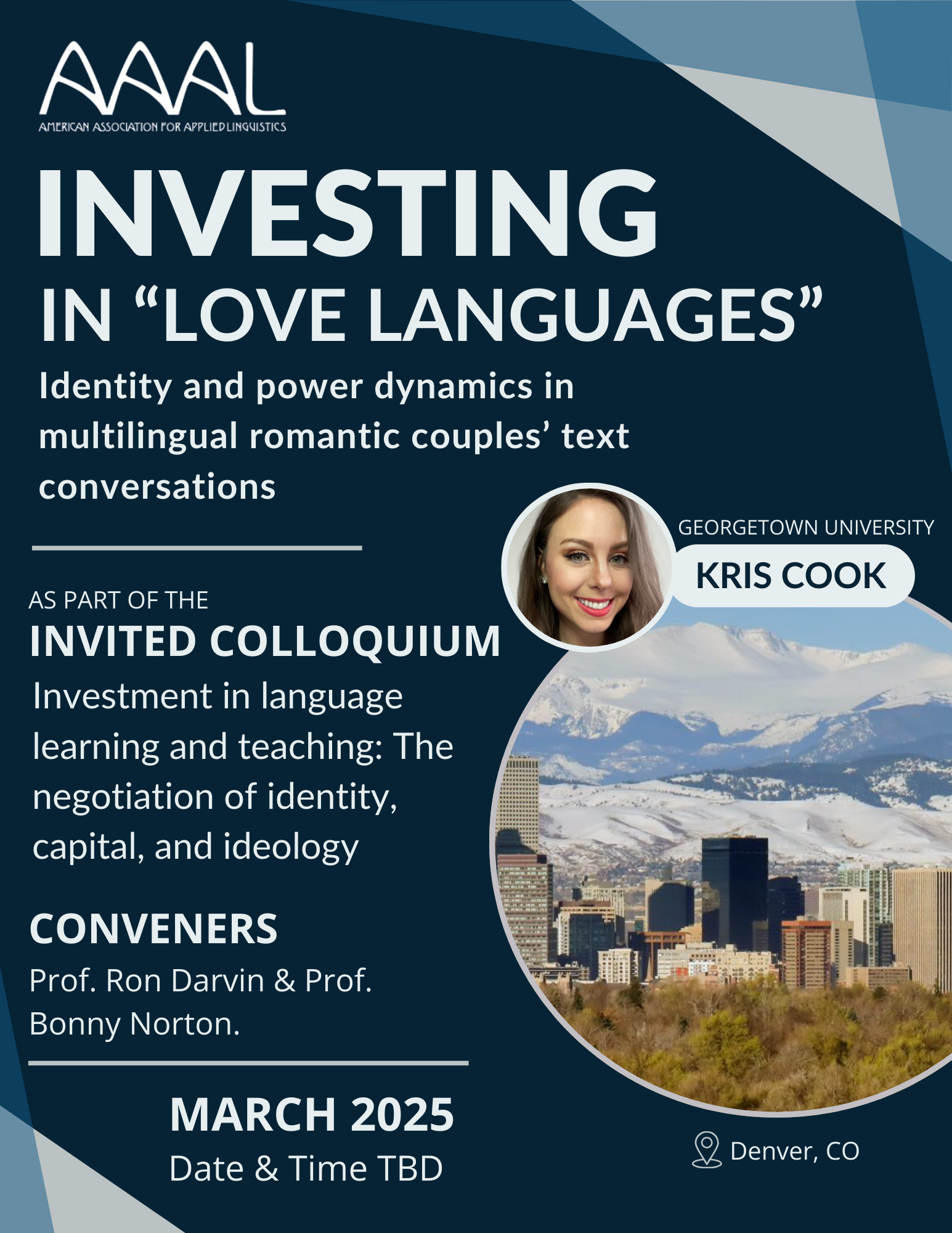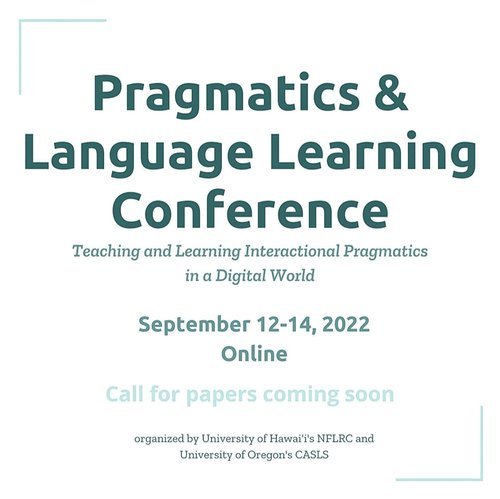UPCOMING CONFERENCES
-

-
Investing in “love languages”: Identity and power dynamics in multilingual romantic couples’ text conversations
[March 2025] To be presented at AAAL 2025 in Denver, CO.
Abstract: The struggle between maintaining one’s language(s) and adopting a partner’s language(s) is common in multilingual romantic couples and depends on many factors (Kiaer & Ahn, 2023). In addition to L2 investment (e.g., Reichmuth, 2020), these relationships provide dynamic contexts for investigating intercultural communication (e.g., Holliday et al., 2021; Piller, 2002), identity development (e.g., Bystydzieński, 2011; Stępkowska, 2021), and language use (e.g., Ang-Tschachtli, 2022). However, the role of texting on L2 investment within multilingual romantic partnerships remains underexplored in linguistics research (e.g., Han, 2019). This mixed-methods study explores how 20 multilingual couples leveraged digital messaging features in their one-on-one text conversations, and investigated (1) how negotiation of identities, capital, and ideologies shaped language investment; (2) how texting functionalities and semiotic resources facilitated language-related episodes (LREs); and (3) the interplay among identity, anxiety, multicultural personality (Ponterotto, 2010), digital communication, LREs, and L2 investment. 20 couples (N=40) completed two Zoom interviews (60 and 90 minutes) and provided screenshots of their text conversations, i.e., language artifacts (e.g., Maa & Taguchi, 2022). Qualitative data was analyzed using NVIVO, focusing on themes of LREs, L2 investment, semiotic resources, and technological functionalities. Coded transcripts were then analyzed via NLP methods in Python 3.11 and descriptively quantified. Next, quantitative data included scores from an adapted language anxiety scale (York et al., 2021) and the Multicultural Personality Inventory-34 (MPI-34; Fietzer & Ponterotto, 2022). Finally, data were analyzed for trends via cluster analysis. Viewed through the L2 investment model (Darvin & Norton, 2015), findings illustrate how partners positioned themselves as language and culture “experts” or “novices” during digitally-mediated LREs, serving as guides, facilitators, and occasionally gatekeepers of their partner’s learning. This study demonstrates how challenges and opportunities, arising from intercultural conflicts, individual differences, (in)accessibility of resources, and digitally-mediated communication, shape couples’ investment in learning their partner’s language(s).
Invited Colloquium on Investment in language learning and teaching: The negotiation of identity, capital, and ideology (Conveners: Ron Darvin & Bonny Norton).
RECENT CONFERENCES
-

-
Digital "Love Languages": L2 Investment and Intercultural Identity Development in Multilingual Couples’ Computer-mediated Conversations
[March 17, 2024] Presented at AAAL 2024 in Houston, TX.
Abstract: Multilingual romantic partnerships provide unique contexts for exploring interplays among intercultural communication (e.g., Piller, 2000, 2002), identity (e.g., Parr, 2013), and L2 investment (e.g., Ang-Tschachtli, 2022; Norton, 2013, Darvin & Norton, 2017; Reichmuth, 2020). As digitally-mediated communication in daily life plays an increasingly important role in facilitating multilingual family relationships (e.g., Palviainen, 2020; Palviainen & Kędra, 2020), there is a need for more research on digitally-mediated communication within multilingual romantic partnerships (e.g., King O'Riain, 2014). This mixed-methods study expands on this digital, multilingual "family talk" research by comparing self-reported and performed language trends in private text messaging within 20 multilingual couples (aged 22–35). Couples had been dating for at least six months and indicated that their partner’s primary language was different from their own. Data collection consisted of two 30-minute sessions via Zoom with each couple. The semi-structureed interview and stimulated recall protocols invited participants to report on their use of digital messaging tools and reflect on their multilingual and intercultural communication experiences, as well as screenshots of their texting conversations (i.e., “language artifacts,” per Maa & Burns, 2021 and Maa & Taguchi, 2022). Qualitative thematic analysis followed guidelines established by Merriam (2009) and Maxwell (2012) for recurring topics of identity and L2 investment (David & Norton, 2017; Norton, 2013) in the interviews and SR sessions as well as salient linguistic features (e.g., emoji, memoji, memes, translanguaging) in the language artifacts. Zoom transcript data of the identity and L2 investment themes were triangulated with quantitative analysis via natural language processing methods of Term-Frequency–Inverse Document Frequency (TF–IDF) and topic modeling. Finally, relationships among themes of identity and L2 investment (self-reported data) and text-based linguistic features (performed data) were explored through cluster analysis, which illustrated how 20 multilingual couples’ unique digital “couple talk” interplayed with the development of their L2 investment and intercultural identities.

PAST CONFERENCES
-
Digital "love languages": L2 investment and intercultural identity development in multilingual couples’ digitally-mediated conversations
[June 9, 2023] Presented online at CALICO 2023: Toward Open, Sustainable and Multimodal CALL, hosted by the University of Minnesota campus in Minneapolis.

-
"No, you go ahead!" Navigating turn-taking in L2 Zoom interactions with a task-based approach
[September 12-14, 2022] Presenting with Co-Author Professor Lara Bryfonski at the Pragmatics & Language Learning 2022 Conference, hosted online by The National Foreign Language Resource Center at the University of Hawai'i at Mānoa and the Center for Applied Second Language Studies at the University of Oregon.
Invited Colloquium on Teaching and Learning Interactional Pragmatics in a Digital World (Conveners: YouJin Kim & Naoko Taguchi).

-
Turn-taking, interruptions, and interjections on Zoom: A task-based approach to L2 pragmatic development
[August 29-31, 2022] Presenting with Co-Author Professor Lara Bryfonski at the 9th International Conference on Task-Based Language Teaching (under the auspices of the International Association for Task-Based Language Teaching [IATBLT]) in Innsbruck, Austria 🇦🇹on the theme of Widening the Horizon of Task-Based Language Teaching.
Invited Colloquium on Task-Based Interaction and Learning in L2 Pragmatics (Convenors: YouJin Kim & Naoko Taguchi).

-
"Sorry to interrupt you": Using tasks to facilitate L2 pragmatic development in online video conferencing
[March 21, 2022] Presented with Co-Author Professor Lara Bryfonski at the American Association for Applied Linguistics 2022 Conference in Pittsburgh, PA.

-
Can Do, Can’t Do: (Mis)Alignment of L2 External and Self-Assessments
[November 20, 2021] Presented with co-author Erin Fell, Ph.D. Student (Georgetown University) via virtual On-Demand Presentation.
Why do some L2 learners think they "can't speak" the target language while others overestimate their skills? This presentation will help participants understand the impacts of personality on L2 learning and self-assessment. Participants will discuss personalized teaching strategies to leverage learners' personality traits to aid L2 self-awareness.

